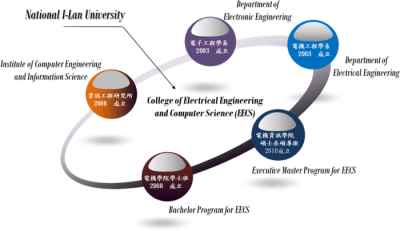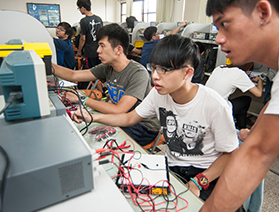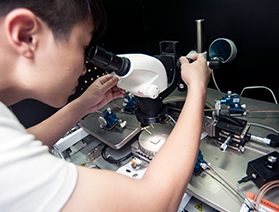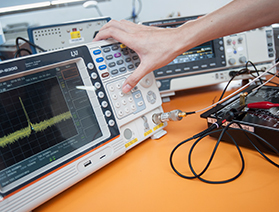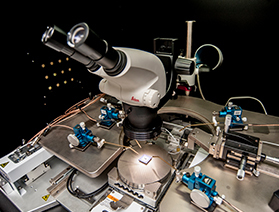Life @ EECS
Introduction
The newly established College of Electrical Engineering and Computer Science at National Ilan University was permitted by the Ministry of Education in October 2005. It is consist of three institutes and their associated departments, including Department and Institute of Electrical Engineering, Department and Institute of Electronic Engineering, where both departments (and their associated institutes) were originally under the jurisdiction of the College of Engineering, and also including the new I nstitute of Computer Science and Information Engineering, which was permitted at the same time as the College.
The Electronics Engineering Department of our college fetches the integrated 4C (i.e. Computer, Communication, Consumer Electronics, Digital Content) features in the fields of electrical and information engineering. Its key points of development comprise three major fields, which are the computer and networking, communication and signal processing, and integrated circuit and computer-aided design. However, the Electrical Engineering department provides correlated curriculum in the engineering fields of electricity transformation, electrical control, and computer engineering as our professional researches based on the industrial demand trend and students' interest. Its development focus lies in the technologies of electricity and electronics, electrical machinery and driven technology, computer, and control engineering.
The Institute of Computer Science and Information Engineering is to full fill the governmental key industry's development policy of “Two Trillion Double Stars Facilitation Plan”. The research will focus on the digital media and network communications, which has been divided into the physical layer, communications layer, and application layer of three major developing directions. The ‘Physical Layer' includes the study of embedded signal processing system software and hardware co-design, network chip design, layout automation. The 'Communication Layer' includes the research and development and build-up of IPv6 network of next generation, mobile and wireless communication network research, and the security of information circulation study. The 'Application Layer ' is mainly about the compression and processing of audio and video signals, digital creative living application technology, digital game software design, and parallel processing and grid computing.
At present, the domestic electrical engineering and computer science relevant fields are still rising and flourishing. The demanding for Hi-Tech professionals is also increasing. So the goal and self-expectation of our college shall be to carry on close industrial/academic/research cooperation with legal person organizations or those science and technology companies in the Science Park 's Yilan base – a Communication and Knowledge Service Park set by National Science Council. It is also our goal and expectation that our outstanding graduates be well-trained through their studies and be able to enter the graduate school of those leading universities or serve important roles in large electrical machinery and well-known technology companies.
The College of Electrical Engineering & Computer Science at present lies in Geezhi building. The total space is about 10485.93 square meters in size. There are 71553 volumes of Chinese and western-language books and 5,687 kinds of relevant electronic periodicals of full text suitable for reference. At the meantime, in order to realize the desired vision of our college , we actively obtain abundant funds, adjust the school system and course content, set up the rewarding policies that can attract outstanding scholars and students, effectively strive for excellent graduate and under-graduate students, and strengthen the research momentum of all teachers. Besides, we would like to train the undergraduate students of our college to stride forward to the omni-directional internationalization. We wish the knowledge would not be limited to a fragmentary way of teaching and instruction. Instead, through our designs of interdisciplinary /cross-department courses and closely related courses associated to our research laboratories, the undergraduate students can study cross-field courses and go into the associated laboratories for practicing, experimenting, and verifying what they learn in courses. And through the interactions with graduate students for taking advisers' counseling, analyzing questions, applying knowledge, and oral report, students shall be able to realize the practical operations, develop the capability of resolving problems in specific professional technical domains, and even train their capability of writing research or technical reports. Moreover, by constantly inviting domestic and overseas eminent teachers to give short-term courses and then reviewing the result and the achievement of study, we believe that “emphasizing a thorough blending of theory and practice” will become an important feature and “emphasizing on both teaching and researching” will become the discipline of College of Electrical Engineering and Computer Science.
